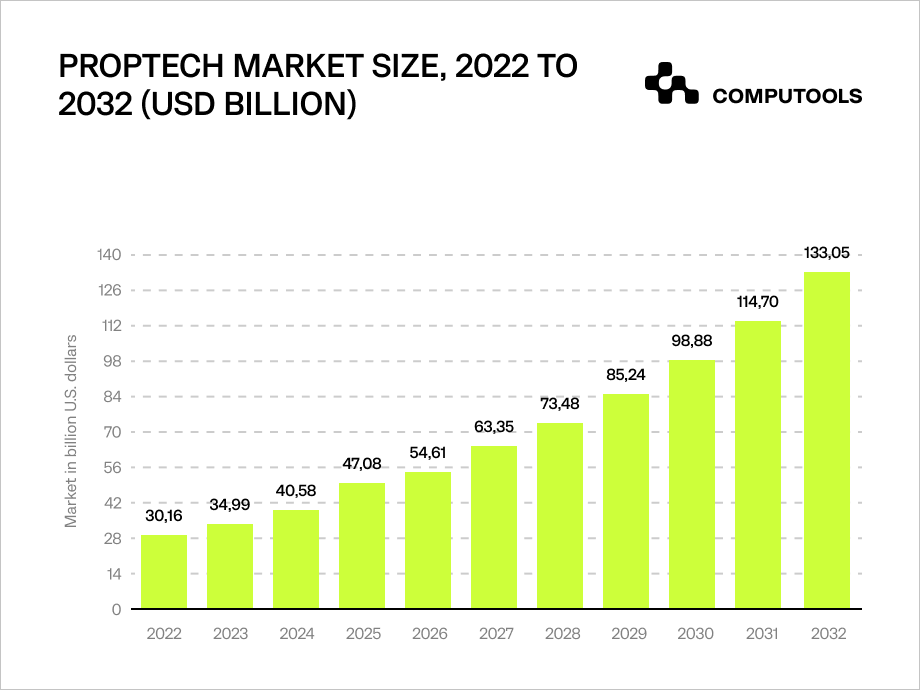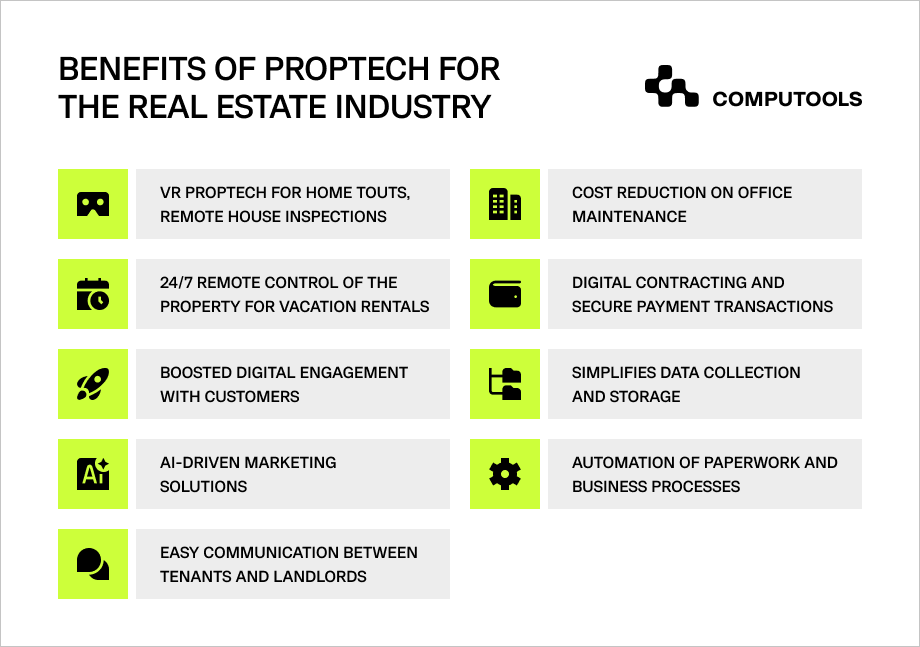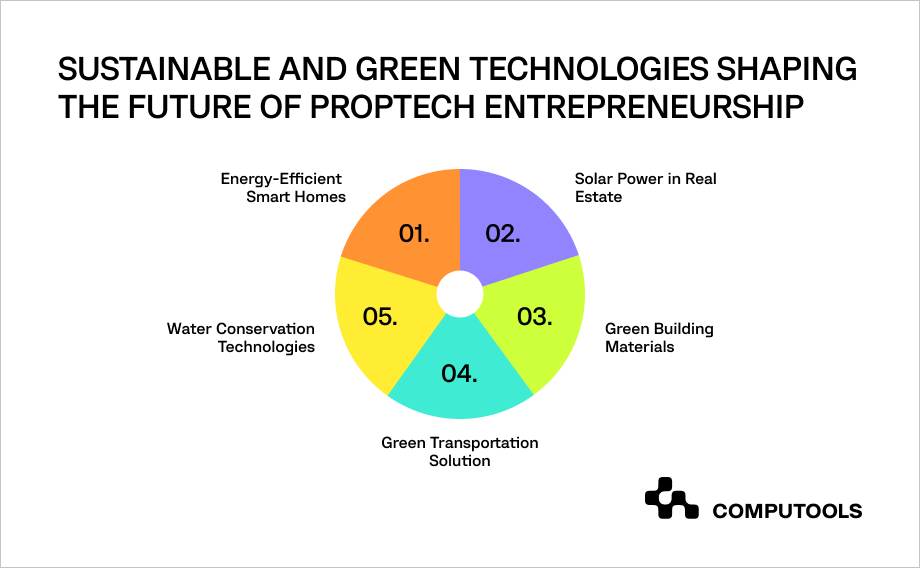The real estate landscape is ever-evolving, influenced by economic shifts, market dynamics and changing consumer tastes. However, in recent years, real estate technology trends have taken the forefront as the main force driving these changes.
As per Precedence Research estimations, the global proptech market is expected to reach around US$133.05 billion by 2032, experiencing a robust compound annual growth rate (CAGR) of 16% from 2023 to 2032.

The property sector is actively evolving and currently undergoing digital transformation. However, the incorporation of technology into the real estate industry has progressed more slowly than in other fields.
This hesitation was partially rooted in a resistance to adopting practices that proved effective in the past. Another contributing factor to the delayed implementation of technology was large companies attempting to develop their own customised tools.
Nevertheless, these challenges are diminishing, and there has been a rise in the demand for real estate tech in recent years. Moreover, businesses in the industry are beginning to grasp the advantages of investing in and leveraging modern technologies.
This article will explore the important real estate innovations that realtors and businesses should adopt to stay competitive and offer excellent service to their clients in 2024 and beyond.
What is Property Technology in Real Estate?
Proptech, short for property technology, refers to the use of various solutions to innovate and enhance processes within the real estate industry.
This technological field combines various digital devices and innovations to improve the processes of buying, selling, renting and managing properties.
Real estate technology diversity ranges from offering virtual property tours and online marketplaces to developing smart home automation systems and home management software.
Where Do These Technologies Make the Most Significant Impact?
1. Transactions
Real estate technology trends significantly change the way properties are bought and sold, making transactions more efficient and transparent. This transformation is not only about improving property dealings but also involves a connection with fintech, enhancing financial transactions related to real estate.
2. Management
Smart buildings and IoT devices bring about a revolution in property management, improving energy efficiency, security and the overall experience for tenants. The use of smart technologies offers a more personalised approach to managing real estate assets, focusing on financial optimisation.
3. Interactions
Real estate marketplaces and online platforms, often connected with fintech solutions, simplify property search and seller-buyer interactions, providing a user-friendly experience.
Through features like virtual tours and digital communication channels, stakeholders can navigate the market with greater ease and convenience, creating a more dynamic and interconnected real estate ecosystem.
Learn more about real estate technology trends.
Contact us →How Do These Solutions Benefit the Real Estate Industry?
Benefits for Realtors
• Better Efficiency
Realtor technology tools automate manual processes, reducing administrative tasks and allowing professionals to focus on strategic aspects of their business.
• Streamlined Communication
Digital platforms ensure seamless communication between realtors, clients and other stakeholders, improving collaboration and responsiveness.
• Data-Driven Insights
Big data analytics tools provide real-time data on market trends, enabling realtors to make informed decisions and offer personalised services to clients.
Benefits for Buyers
• Time and Cost Saving
Modern solutions enable virtual tours, allowing buyers to explore properties remotely, saving time and travel expenses.
• Transparent Information
Online platforms provide comprehensive information about properties, ensuring buyers make informed, well-thought-out decisions.
• Digital Transactions
Digital transactions and secure payment options simplify the buying process, enhancing convenience for buyers all over the world.
Benefits for Real Estate Businesses
• Global Reach
Online marketplaces and digital marketing tools broaden the reach of real estate businesses, connecting them with a global audience.
• Risk Mitigation
Innovative solutions offer data-driven risk assessments, helping real estate businesses make sound investment decisions and manage potential risks.

Real Estate Technology Trends: Navigating the Future
Remaining ahead of the curve and grasping the upcoming trends in real estate is very important for success in this industry. We’ve highlighted some of the most popular property technology trends for 2024 and beyond.
1. Big Data Analytics
Big Data in real estate involves analysing large and complex sets of information to get useful insights. It helps predict market trends, understand buyer behaviour and improve property values.
Realtors can use information from different sources, such as real estate listings, market trends, consumer behaviour and demographics, to make smart steps in advertising. These insights also help them decide on pricing, identify target groups and improve marketing efforts.
2. Internet of Things (IoT)
IoT connects smart devices and sensors to collect and share data. In real estate, IoT makes property management better through smart home systems, monitoring energy use and improving security.
IoT solutions may include features like robot vacuum cleaners, automatic lights, detection sensors and wireless appliances that quickly respond to people’s needs. All smart amenities and devices communicate through Wi-Fi and intelligent access controls.
By the way, smart homes happen to be one of the highly sought-after trends in the real estate sector for apartment websites and property platforms.
3. Blockchain
One of the noteworthy benefits of blockchain real estate technology is the clarity it offers. Buyers and sellers can effortlessly authenticate property ownership and transaction history, diminishing the reliance on third parties.
Furthermore, smart contracts facilitated by blockchain can automate specific elements of real estate transactions, such as escrow and payment processing, enhancing both efficiency and security in dealings.
4. Drones
Drones are increasingly used for checking properties, inspections and getting aerial views. This solution presents a great technology for real estate agents, who can cost-effectively and safely check property conditions and monitor construction.
Additionally, drones map neighbourhoods over time, recording price changes and offering valuable insights for investors and agents. This technology is expected to become more common in the real estate industry in the coming years.
5. 5G Technology
The arrival of 5G brings faster and more reliable connections to the property sector. 5G supports smart home devices, helps manage properties remotely and makes data-heavy applications work better. Homes with 5G can easily handle things like smart security and gas or smoke detection systems, automated lights and other gadgets.
Agents can also give quick updates about properties, have clear video chats for virtual tours, and keep in touch with clients easily, offering a modern, connected lifestyle that’s simple and efficient.
6. Artificial Intelligence and Machine Learning
Artificial Intelligence (AI), coupled with machine learning (ML), undeniably represents the future of the property sector, providing a range of real estate technology tools.
Artificial solutions can be applied across various aspects, including automating customer service, spotting property trends, giving accurate values, understanding customers’ needs and making the overall buying experience better.
Additionally, McKinsey found that using machine learning in real estate can predict changes in rent rates with 90% accuracy and other property metrics with 60% accuracy. This helps clients figure out which property is a better investment, whether it’s for business or personal needs.
7. Digital Twins
As information becomes increasingly accessible online, potential buyers will have more opportunities to examine and explore properties. Digital twins make virtual copies of physical properties. In real estate, they help with better design, construction and management by giving a real-time digital view of a property.
These applications can predict crucial environmental conditions a specific house can endure, such as earthquakes, tornadoes and landslides. Maintenance companies will be aware of the current conditions of buildings, including existing and potential damage as well as the date and place of repair, along with the fire escape plan.
Furthermore, digital twins can be beneficial during the construction of houses, aiding developers in understanding the safety of their projects.
8. Virtual and Augmented Reality
With VR, clients can take 3D virtual tours of properties from home, exploring every room, understanding the layout and even getting a sense of the neighbourhood.
AR, on the other hand, adds digital information to the real world. It enhances property viewings by giving real-time details about nearby amenities, schools and transportation options.
Using VR and AR in real estate not only saves time but also broadens the reach of property listings. Realtors adopting these technologies can provide a modern experience and attract a wider range of interested buyers. Goldman Sachs predicts that the VR market will approach nearly US$80 billion by 2025, driven in great part by the real estate sector.
9. Property Management Software
To put it simply, property management software is the ultimate tool to make everyone’s life easier. It centralises information, storing lease agreements, tenant details and maintenance schedules in one accessible place.
This software also excels in maintenance tracking, allowing users to receive alerts and detailed records. Real estate software development with an integration of accounting systems also helps in financial management, generating reports and tracking expenses.
10. Cybersecurity
Protecting sensitive data is a paramount task for the reputation of any real estate business. Cybersecurity technologies pose the most important trend in real estate development, and it will stay a priority beyond 2025.
Various software companies and start-ups offer solutions for encrypting data, preventing cyberattacks, securing network traffic and managing risks. There are also tools to track compliance with regulations, avoiding issues with data security laws.
Specialised cybersecurity tools for buildings allow security staff to remotely manage risks and access systems, making real estate development sites safer places to work.
Future Forecasts for Real Estate Technology
Looking forward, we can say that technology will continue reshaping the operations of real estate professionals and businesses. With the world’s population set to double by 2050, the demand for real estate is also predicted to double, as well as the need for innovative solutions.
To secure a promising future of real estate technology, stakeholders must actively pursue innovations and take proactive development steps. So, what do the upcoming years hold for the real estate industry?
The development of artificial intelligence, machine learning, blockchain, augmented reality and other innovations will persist in streamlining processes and reshaping traditional practices.
These trends will also receive support from the number of property start-ups, which is increasing each year. The introduction of new technologies will inspire entrepreneurs, actively contributing to the ongoing digital transformation within the sector.
A key focus in real estate technology trends will be on sustainable and green technologies.
As the industry becomes more environmentally aware, it’s anticipated there will be an increase in the use of energy-efficient designs, waste management systems, water conservation technologies, and biodiversity-friendly landscaping that are integral components of the property technology toolkit.

By implementing these solutions, property owners will lower operational expenses, improve tenant satisfaction, and respond to the increasing desire for environmentally conscious living environments.
Conclusion
To sum up, the future of real estate is definitely connected to technological progress. Realtors who embrace these real estate software solutions will not only stay competitive but also offer a great experience to their clients.
From virtual reality property tours to ML-driven insights, blockchain transactions, and IoT connectivity, technology is really changing the industry.
If you’re thinking about bringing real estate software development into your business, don’t hesitate. In 2024, you can already reap the rewards of emerging technologies and stay one step ahead of your competitors.
Navigate through the challenges your digital business encounters with the expertise of our team. Reach out to us at info@computools.com for tailored solutions.











Computools was selected through an RFP process. They were shortlisted and selected from between 5 other suppliers. Computools has worked thoroughly and timely to solve all security issues and launch as agreed. Their expertise is impressive.